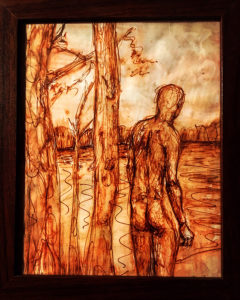A few episodes of my tryst with public nudity in Europe–contrary to expectations, it’s not lewd or perverse
Sketching people in the nude for the last 15 years —more than 500 men and women, rather indiscriminately, from all walks of life—makes me believe that nudity is the most potent way of self-assertion. I also like to believe I’m a traveller and travelling is not just about time well spent discovering a new place, but a journey unto self, to rediscover my own hidden self.
Every year, now for a decade, I spend a month backpacking in Europe—this year is a notable exception, thanks to the pandemic. I have many friends who are admirers and supporters of my tryst with nudity—Jan Peters, Paavo Yliluoma, Ulrich, and some of my other co-conspirators would not want to be named. They have exposed me to places where nudity is the norm. In such places, people get spotted and pointed out if they are seen with their clothes on. And these are happy places, and, in subtle ways, demonstrating nudity is NOT perversion or immoral or sexual—it’s just a state when you are very close to nature and your natural way of being.
It was wonderful to spend a good part of the sunny day with friends on a nude beach on the Baltic Sea—near Zingst an der Osterley. To swim naked in the sea is one of the most profound experiences I have ever had, I felt so integral to everything around me. Facing the sea, while standing naked on a golden beach of fine sand, legs shoulder apart, hands stretched out wide on either side, as the winds gushed past me, I realised that we exist in a cocoon, are victims of our belief system, prejudices and habits. And to be free involves unlearning, is magical—purely experiential. Words fail to describe this elated state of being when you’re in sync with self and the nature around you.

This beach is in East Germany, which till 1989 was under communist rule. Nudity was one of the potent ways of expressing individuality during those oppressive times making Freikörperkultur (free body culture or FKK, as it is popularly known) popular. It was more of a naturalist approach of community living, experiencing nature without filters, without a direct relationship to sexuality. Sexual activities are not permitted, here nudity is an existential reality, the idea is to just exist in the moment, and not as a means to a certain objectionable end.
I had a wonderful interaction with three generations of a German family, grandparents, well past their prime, were most comfortable with their bareness, so much so that they had almost forgotten about it. They interacted with me, we ended up talking about my travels and their visit to India many decades ago when Indira Gandhi was prime minister. Their sons and daughter, in their thirties, were acutely conscious of nudity, mine as well as theirs, offered me sandwiches. And their children, three kids between 7 to 11 years, were wearing swimming trunks. It was a bit paradoxical, and I couldn’t muster the courage to ask the reason for it.
Jan told me about his growing up years in a family where nudity was perfectly normal. His mother, now in her 70s, still goes for her morning swims in a lake close to her house in Oldenburg—naked. We also went there and lay bare in the grass, it felt very nice. There are such places in all the big cities in Germany like Berlin, Leipzig, and Frankfurt, to name a few. Those who like to expose their physical self to the elements are welcome, and those who don’t are fairly tolerant towards those who do.
And at the risk of generalising, the older people are more comfortable with their bareness. For nudity is not about flaunting your body, akin to eye candy, but to be absolutely comfortable with your physical being, despite it being a testament of slow yet progressive decline.
The sauna culture of Finland is very dear to me, and I’m grateful to Paavo for introducing it to me. The dress code is strictly naked, and wearing a piece of clothing is rude. I had no intention to be rude to my hosts. The first time in the sauna was with Paavo and his father in their home in Raudaskyla. A wooden small sauna room was attached to the bathroom. It was very awkward. The practice is that after being in a sauna till it’s unbearable, it feels like blood boiling, you go and sit out in the open, and back again before you’re cold. All this while, sipping beer from a small can. Beer helped me deal with the awkwardness of the moment, but now I am fairly comfortable—have experienced public saunas, with friends and strangers.
I went with a gang of Paavo’s childhood friends to the woods, there was a log cabin by a lake surrounded by tall trees. It took an hour to heat up the sauna inside the log cabin. The dry heat turned me curry red, and we’d run out and take the plunge in the lake. I was heated to my bones and didn’t even feel the cold water. And the moment you do start to feel cold in the water is when you get out and go back to the sauna. This cycle was repeated half a dozen times, by the end of it I felt numb-relaxed and very hungry. I was treated with reindeer sausage, blood sausage, and beer while we sat around a bonfire as the sunlight faded out.
This is just the tip of the iceberg of my experiential journeys. But I can say, nudity has made me a better person, less judgemental and more experiential—also fairly blunt. Nudity has opened many doors of perception.





